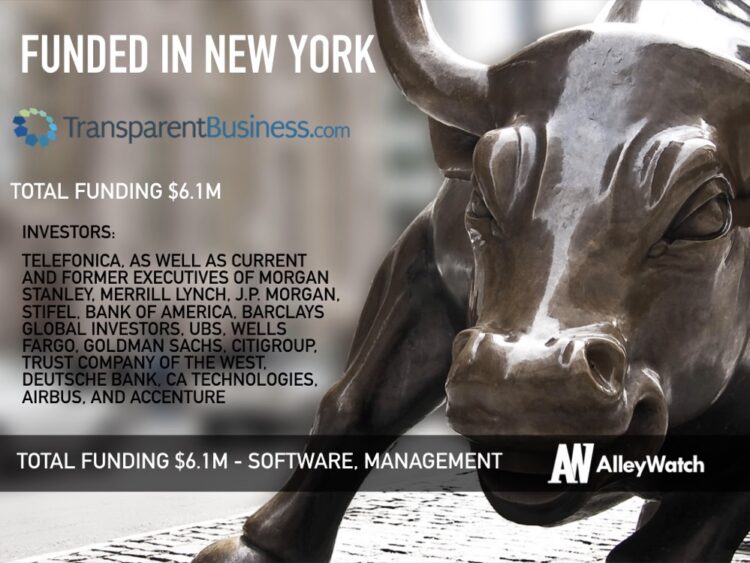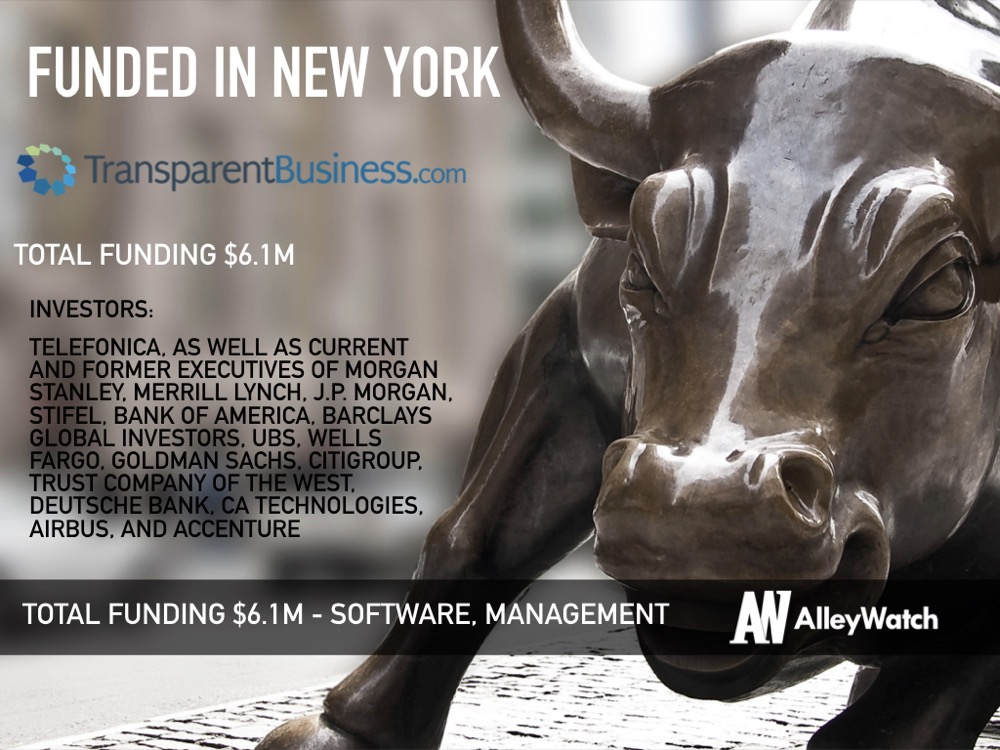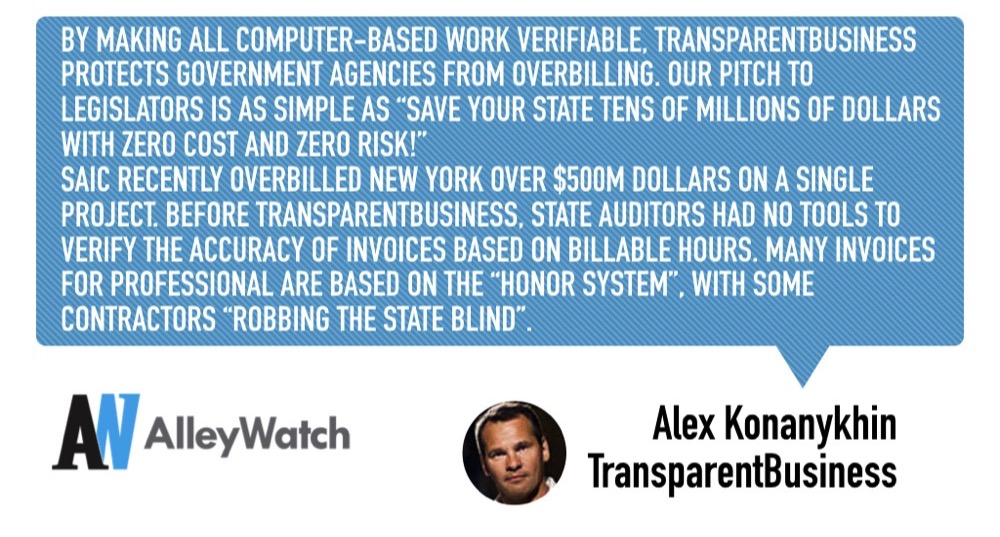Remote work is becoming increasingly popular. According to a recent report issued by FlexJobs and Global Workplace Analytics, in the U.S. alone, there has been a 44% growth in remote work over the last five years. The dubious side of remote work is that it’s easy for remote contractors to overbill clients like the case of SAIC and NYC in 2012. The latest solution to this problem is TransparentBusiness, the company that makes it easy to used to monitor and coordinate any type of computer-based work, while still respecting a user’s privacy. Named by CitiGroup as the “Top People Management Solution”, TransparentBusiness states that it can coordinate and boost remote productivity by 15-40%. Additionally, TransparentBusiness is embarking on a bigger mission to make transparent verification of billable hours required by law. Already 33 states have introduced the bills that are underpinned by TransparentBusiness’ suggestion.
AlleyWatch interviewed CEO Alex Konanykhin to learn more about the state of remote work, the company’s future plans, and recent Initial Private Offering, which completely bypassed the venture process.
Who were your investors and how much did you raise?
Our investors include Telefonica (#141 on the Forbes’ list of the World’s Largest public Companies) as well as current and former executives of Morgan Stanley, Merrill Lynch, J.P. Morgan, Stifel, Bank of America, Barclays Global Investors, UBS, Wells Fargo, Goldman Sachs, Citigroup, Trust Company of the West, Deutsche Bank, CA Technologies, Airbus, and Accenture. We’ve just completed our second round, bringing the total amount raised to over $6M.
 Tell us about the product or service that TransparentBusiness offers. Designated by Citigroup as the “Top People Management Solution” our platform greatly increases the productivity of remote work, protects from overbilling, allows for easy monitoring and coordination of geographically distributed workforce and provides real-time information on the cost and status of all tasks and projects.
Tell us about the product or service that TransparentBusiness offers. Designated by Citigroup as the “Top People Management Solution” our platform greatly increases the productivity of remote work, protects from overbilling, allows for easy monitoring and coordination of geographically distributed workforce and provides real-time information on the cost and status of all tasks and projects.
What inspired the start of TransparentBusiness?
TransparentBusiness was developed in 2008 as an internal tool for KMGi, an IT outsourcing company, in order to make the work of its programmers, designers, and animators visible to its clients.
How is TransparentBusiness different?
TransparentBusiness makes all computer-based work easy to monitor and coordinate by making it visible (“transparent”) to the managers and clients.
What market does TransparentBusiness target and how big is it?
The market is roughly 20x larger than that on which Salesforce.com has reached a $145B valuation. Whereas Salesforce. com provides a CRM solution for B2B salespeople, TransparentBusiness can be used to monitor and coordinate any type of computer-based work.
TransparentBusiness seeks to become the primary tool for managing the work process of the hundred millions of people who do computer-based work worldwide.
What’s your business model?
SaaS. We strive to become synonymous with the categories of Business Transparency and Remote Workforce Management. Our business model is the same as with Salesforce.com and other SaaS platform which charge a licensing fee per each user. In our case, it’s $30 per month per user.
What was the funding process like?
Instead of seeking funding from Venture Capital funds, we conducted an Initial Private Offering by advertising it in the Wall Street Journal, Investor’s Business Daily, Bloomberg and other news media.
What are the biggest challenges that you faced while raising capital?
Overcoming “it’s too good to be true” knee-jerk reaction to our argument that TransparentBusiness is a possible hectacorn was definitely the most challenging obstacle. To resolve this issue, we’ve produced and placed at kmgi.us/506 a series of videos that address the typical points of concern of prospective investors.
Nominations closing THIS WEEK for AlleyWatch’s 2020 NYC Tech Influencers feature. Know someone amazing who belongs on this list? Nominate them today here. FINAL DEADLINE 2/28. Looking to drive targeted response from the NYC Tech community at scale, learn more about partnering with AlleyWatch on this initiative here.
What factors about your business led your investors to write the check?
Most of our investors are financial and IT executives who know that successful tech projects may generate an astronomical return on investment. They invested when we succeeded in convincing them that all factors required for such success are present in TransparentBusiness.
What are the milestones you plan to achieve in the next six months?
We hope to have our bills starting to become a law, making transparent verification of billable hours the new standard of public procurement.
Can you discuss the TransparentBusiness bills?
Legislators in 33 states have introduced the bill suggested by TransparentBusiness, seeking to make transparent verification of billable hours mandatory.
By making all computer-based work verifiable, TransparentBusiness protects government agencies from overbilling. Our pitch to legislators is as simple as “Save your state tens of millions of dollars with zero cost and zero risk!”
Overbilling cases amount to hundreds of millions of dollars. For example, SAIC recently overbilled New York over $500M dollars on a single project. Before TransparentBusiness, state auditors had no tools to verify the accuracy of invoices based on billable hours. Many invoices for professionals are based on the “honor system”, with some contractors “robbing the state blind”.
TransparentBusiness gives state managers real-time information about the work performed for the state by programmers, architects, engineers, and other professionals, but does not intrude on their privacy. The tool is controlled by the worker, who can start and pause it whenever they wish, so only billable activity is documented.
TransparentBusiness boosts the productivity of billable time 15-40% by eliminating time wasters from the billing. We preclude contractors from billing the state for the time spent engaged in non-project related activities such as online shopping, playing computer games, chatting with friends, updating social profiles, watching funny videos, sending out resumes or even working for another client.
The savings would come to the state at no cost to taxpayers, as contractors will bear the modest cost of complying, just like they have always absorbed other accounting costs. There’s also no risk, as TransparentBusiness is available from ADP, the largest payroll processing company and a component of NASDAQ and S&P.
What advice can you offer companies in New York that do not have a fresh injection of capital in the bank?
Be ultra-conservative in spending your remaining capital as the U.S. economy is overdue for a recession and the COVID-19 pandemic may trigger it.
Where do you see the company going now over the near term?
The Coronavirus pandemic illustrated the importance of Transparent Remote Work Management as a Key Element of Emergency Preparedness. Our objective is to present TransparentBusiness to the national, provincial and municipal governments in China, to the governments of other countries and to the corporate leaders around the world as the indispensable emergency response/preparedness tool.
Remote work there is no longer a matter of convenience or economic efficiency;
it’s literally a matter of life and death.
Our objective is to present TransparentBusiness to the national, provincial and municipal governments in China, to the governments of other countries and to the corporate leaders around the world as the indispensable emergency response/preparedness tool.
Unnecessary commute and congregating in office buildings increases the rate of spread of the decease. Accordingly, the most populous country in the world, with 1.5B inhabitants is urgently switching to a remote work model. Other governments are preparing for similar emergencies. Managing remote workers blindly is notoriously inefficient. TransparentBusiness makes remote computer-based work easy to monitor and coordinate and boosts its productivity by 15-40%.
Where is your favorite bar in the city for an after-work drink?
The Aviary. It’s spacious, has great views and not too noisy.
Nominations closing THIS WEEK for AlleyWatch’s 2020 NYC Tech Influencers feature. Know someone amazing who belongs on this list? Nominate them today here. FINAL DEADLINE 2/28. Looking to drive targeted response from the NYC Tech community at scale, learn more about partnering with AlleyWatch on this initiative here.





